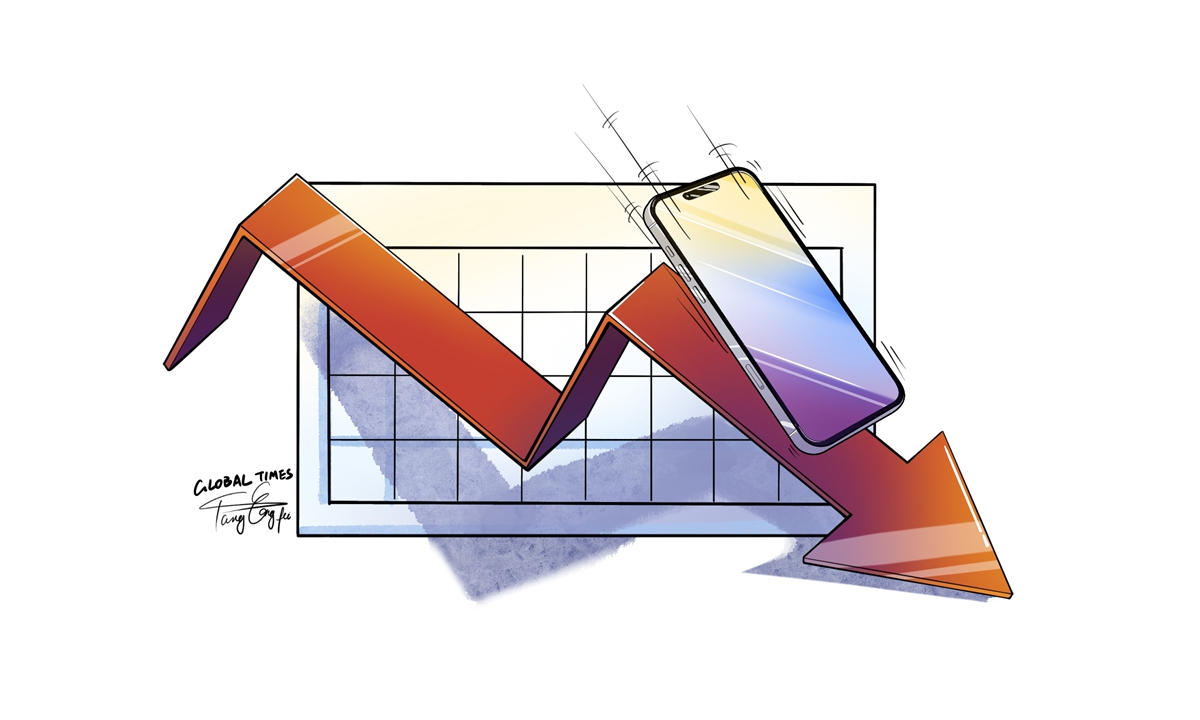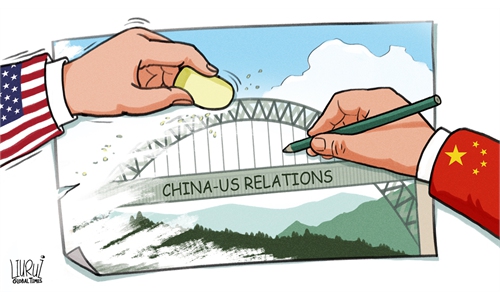
Illustration: Tang Tengfei/Global Times
US technology company Apple's share price fell 3.7 percent on Tuesday, the first trading day for the US stock markets in 2023, as the tech rout hit the iPhone maker, pushing its market value below $2 trillion. On the first trading day of 2022, Apple's shares once hit $182.88, making it the first company to record a market valuation of above $3 trillion.The evaporation of $1 trillion, or one third of Apple's total market value, in only one year, is indeed concerning. However, it's no reason for Western media outlets to repeatedly attempt to shift blame and smear China's supply chain even as the country's response to the COVID-19 pandemic has been being adjusted and optimized according to the actual condition to guard public health and secure economic activities.
Apple struggled with iPhone 14 Pro shipments during the holiday season because of "COVID restrictions on its primary factory in China," US financial media CNBC said, when reporting Apple's stock price plunge on Tuesday. Last week, the US media Voice of America also blamed the US smartphone maker's stock price plunge in 2022 on China's policies.
Evidently, such accusations are contrary to the facts and don't hold water. The dramatic fall in the market value of Apple last year was among an overall slump of US technology stocks, and there are varied reasons behind it. However, it should never be blamed on the Chinese suppliers that have provided strong support for Apple's success even amid disruptions caused by the pandemic and US tech crackdown.
In fact, it is the weakening demand for Apple products that has dragged down the performance of Chinese suppliers. According to media reports, Apple has notified suppliers in China to reduce the production of AirPods, Apple Watch and MacBook components this season on the grounds of weakening demand. Affected by the news, the share price of Chinese company Luxshare, a major supplier for Apple, plunged to its 10-percent lower limit on Wednesday.
In the past few months, Apple has been repeatedly reported to cut orders. What are behind the weakening market demands are multiple reasons including the slowdown of the global economy, the lingering pandemic, and the US Federal Reserve's interest rate hike. Moreover, Apple is also facing an increasingly competitive market in China as domestic smartphone brands such as Huawei, Xiaomi, Oppo and Vivo have gained increasing popularity.
In October 2022, there were reports that Apple planned to reduce production of its iPhone 14 Plus while it re-evaluates demand. The "iPhone 14 may become the worst-selling model ever" topped the search list on China's Twitter-like social media platform Sina Weibo at one point in September 2022. Clearly, whether it is in China or other markets, iPhone's future lies in its innovation and understanding of market trends.
The purpose of Western media outlets' blame is nothing more than bad-mouthing the Chinese economy and inciting companies to move their manufacturing out of China, but such an attempt is doomed to fail. Apple and other foreign enterprises know well that China's supply chain, manufacturing advantages, resilience, and development potential will be indispensable factors to support them to achieve greater success in the future.
Apple suffered multiple shutdowns in other countries due to the pandemic in the past couple of years, but stable production in China has helped the company expand its smartphone market share. In 2023, China's economy will continue its recovery momentum, and its industrial supply chain and mobile phone manufacturing industry will also accelerate recovery. This will only further support Apple and help it cope with fluctuations in market demand, not the other way around.
The author is a reporter with the Global Times. bizopinion@globaltimes.com.cn



